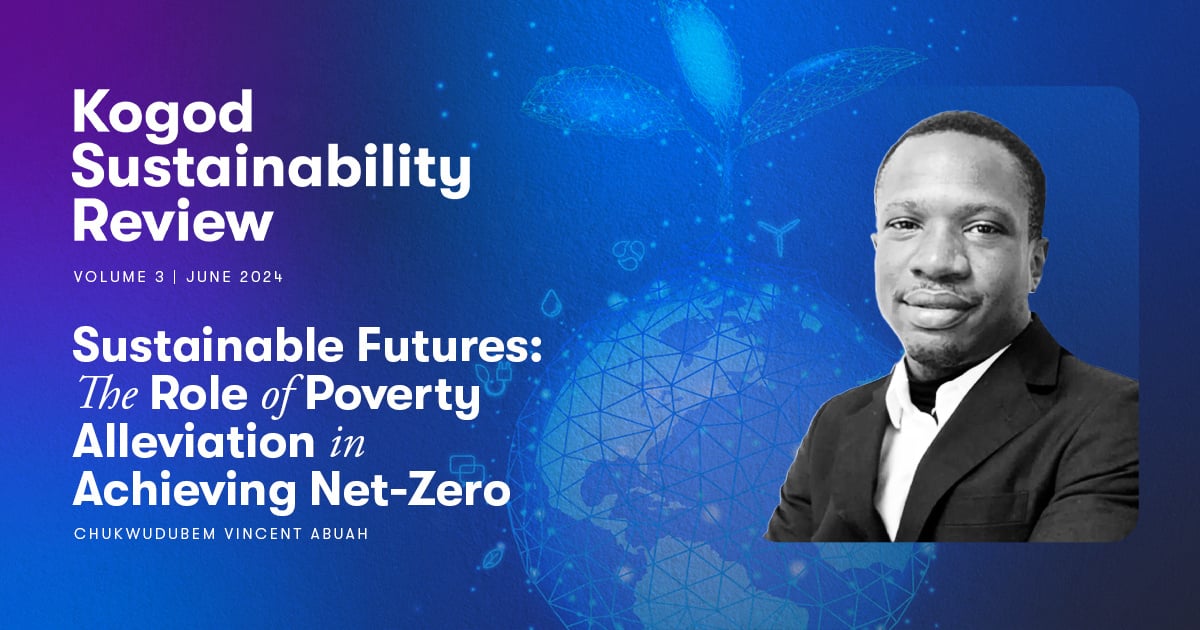
Chukwudubem Vincent Abuah
MSSM Student, Kogod School of Business
"Poverty is the worst form of pollution." — Indira Gandhi
This profound statement by Indira Gandhi serves as a compelling prelude to exploring the intricate relationship between poverty eradication and the global pursuit of net-zero emissions. It illuminates the notion that the battle against climate change is an environmental challenge and a socio-economic imperative. As we navigate through the complexities of this interconnection, we uncover the transformative potential of harmonizing human prosperity with the vitality of our planet, underscoring the principle that the path to environmental sustainability is inseparably linked with uplifting the world's most vulnerable communities.
In an era marked by climate urgency, the entwined issues of global poverty and climate change demand our immediate attention. The stark reality is that climate change inflicts its harshest penalties on the world's impoverished populations, who, despite contributing minimally to global emissions, bear the brunt of its devastating impacts. This article delves into the disproportionate effects of climate change on vulnerable communities, examines the cyclical relationship between poverty and environmental degradation, and highlights innovative, integrated solutions that offer hope for a sustainable and equitable future.
The Disproportionate Impact of Climate Change on Vulnerable Populations
The harsh truth is that climate change does not affect everyone equally.
Vulnerable populations, particularly in regions like Bangladesh and sub-Saharan Africa, find themselves on the frontline of climate adversity."

Chukwudubem Vincent Abuah
MSSM Student, Kogod School of Business
In Bangladesh, the encroaching seas and intensifying storms pose existential threats to millions, exacerbating the fragility of their socio-economic conditions (World Bank 2021). Sub-Saharan Africa faces its own set of challenges, with changing precipitation patterns and droughts undermining agricultural livelihoods and pushing communities deeper into the chasm of poverty (ActionAid 2023).
The Vicious Cycle: Poverty and Environmental Degradation
The dynamics of poverty and climate change create a self-perpetuating cycle: poverty constrains communities' adaptive capacities, rendering them more susceptible to climate impacts, which in turn, entrenches them deeper into poverty. This susceptibility manifests in various detrimental ways. For example, communities with limited financial resources often lack the infrastructure to withstand extreme weather events like floods or droughts, leading to greater physical and economic damage. Additionally, poverty restricts access to information and technology that could help mitigate the effects of climate change, leaving these populations disproportionately affected by environmental disruptions. This heightened vulnerability exacerbates their existing economic challenges and hinders their recovery from environmental disasters.
The Sahel region's (African subcontinent) struggle with desertification, driven by unsustainable land practices, exemplifies this cycle, diminishing food security and compounding poverty (UNDP 2021). Unsustainable land practices have accelerated this process, drastically reducing arable land and diminishing food security.
As the environment becomes less hospitable, the local communities find it increasingly difficult to sustain agricultural productivity, plunging them deeper into poverty."

Chukwudubem Vincent Abuah
MSSM Student, Kogod School of Business
Bridging Divides: Integrated Solutions for Poverty and Climate
Confronting the dual challenge of poverty and climate change requires solutions simultaneously focusing on poverty alleviation and climate mitigation. One promising strategy is "climate-smart agriculture," which incorporates sustainable practices that enhance food security and minimize environmental impact. In Kenya, adopting drought-resistant crops such as sorghum and millet, coupled with efficient irrigation techniques like drip and sprinkler systems, exemplifies the potential of such integrated approaches. These innovations bolster resilience against climatic extremes and reduce emissions, showcasing a path forward that can sustain agricultural productivity in the face of environmental challenges. The positive impact in Kenya has been profound, with significant increases in crop yields and enhanced water use efficiency, helping communities stabilize food supplies and improve economic stability during drought periods (FAO 2020). This approach is aligned with the recommendations of the Food and Agriculture Organization, which highlights the critical role of climate-smart practices in ensuring sustainable food systems globally.
Catalyzing Change: Financial and Technological Support
The imperative for wealthier nations (such as the United States, Germany, China and Japan) to support climate action in developing countries cannot be overstated. Financial initiatives like the Green Climate Fund and technological transfers are pivotal in facilitating the transition to sustainable practices, offering a lifeline to communities, and enabling them to leapfrog to cleaner, more sustainable technologies (Green Climate Fund 2021).
Empowerment Through Education and Innovation
Education is a powerful tool for empowering vulnerable communities to confront climate change. Programs such as Solar Sister in Sub-Saharan Africa highlight the transformative impact of educating women on renewable energy technologies, fostering community resilience, and contributing to environmental stewardship (Solar Sister 2021). Some of these impacts include empowering over 6800 women entrepreneurs to build clean-energy businesses and providing clean-energy access to over 1.5 million people in Nigeria, Tanzania, and Uganda, through solar lamps, phone chargers, and clean cookstoves.
Conclusion
Our journey towards net-zero emissions is inextricably linked to the global crusade against poverty.
The stark disparities in climate change impacts highlight a profound injustice and underscore the indispensable role of poverty alleviation in the broader climate agenda."

Chukwudubem Vincent Abuah
MSSM Student, Kogod School of Business
By championing integrated solutions that address both socio-economic development and environmental sustainability, we can forge a path towards a more resilient and equitable future. The quest for environmental sustainability, therefore, is not just an environmental mandate but a profound moral and strategic imperative in our collective pursuit of a just and sustainable world.
References
- ActionAid. "Climate Change and Poverty." ActionAid, 2023, www.actionaid.org.uk/our-work/emergencies-disasters-humanitarian-response/climate-change-and-poverty.
- Food and Agriculture Organization of the United Nations (FAO). "Climate-Smart Agriculture." FAO, 2020, www.fao.org/climate-smart-agriculture/en/.
- Green Climate Fund. "About the Fund." Green Climate Fund, 2021, www.greenclimate.fund/about.
- Solar Sister. "Empowering Women with Renewable Energy." Solar Sister, 2021, www.solarsister.org/.
- United Nations Development Programme (UNDP). "Climate Change and Poverty." UNDP, 2021, https://www.undp.org/asia-pacific/press-releases/climate-change-threatens-worsen-poverty-hunger-asia-pacific-and-stall-progress-sdgs-warns-new-report
- World Bank. (2022, October 31). “Urgent climate action crucial for Bangladesh to sustain strong growth”, The World Bank, https://www.worldbank.org/en/news/press-release/2022/10/31/urgent-climate-action-crucial-for-bangladesh-to-sustain-strong-growth
- "Solar Sister: Uganda Women Lights Up Entrepreneurial Spirit." The Guardian, 18 July 2016, www.theguardian.com/global-development/2016/jul/15/solar-sister-uganda-women-lights-entrepreneurial-spirit.
